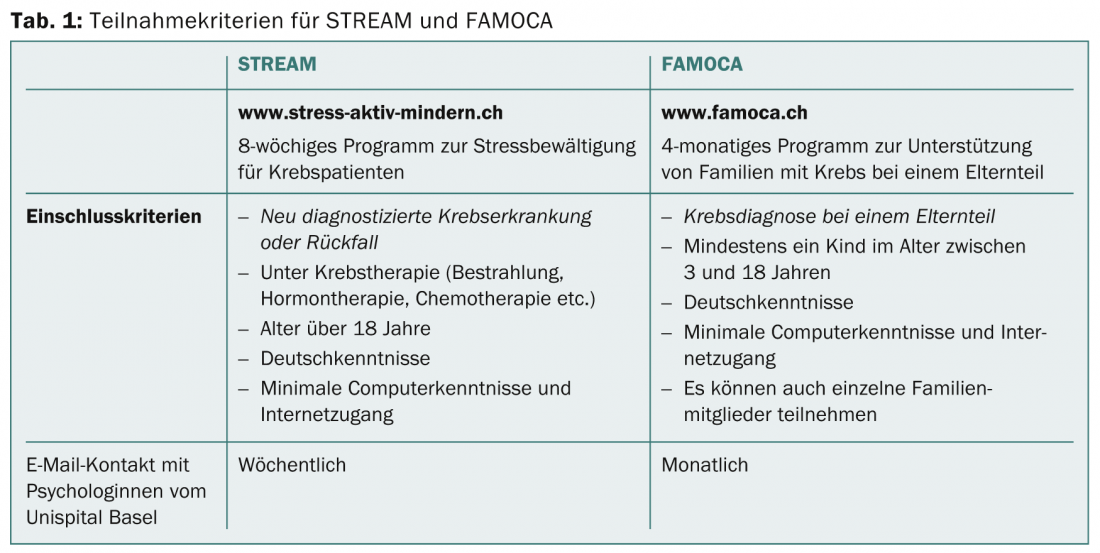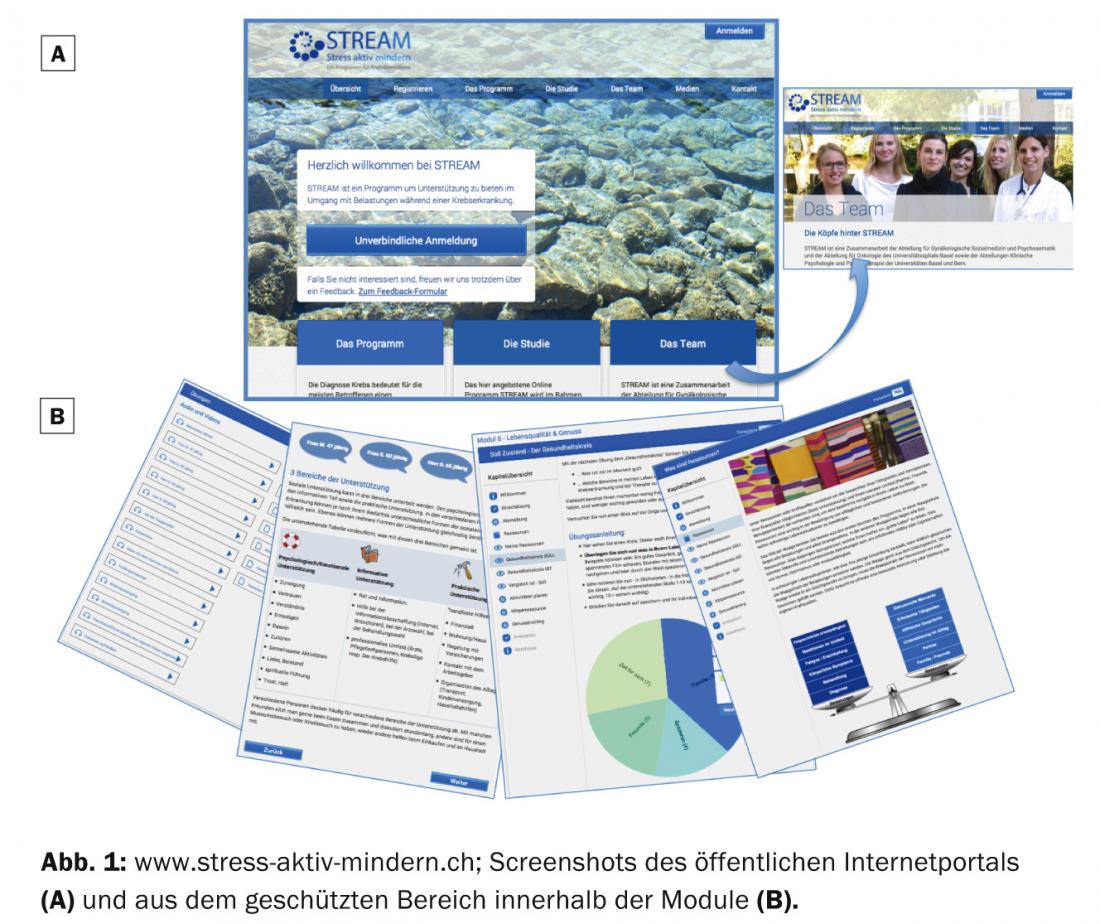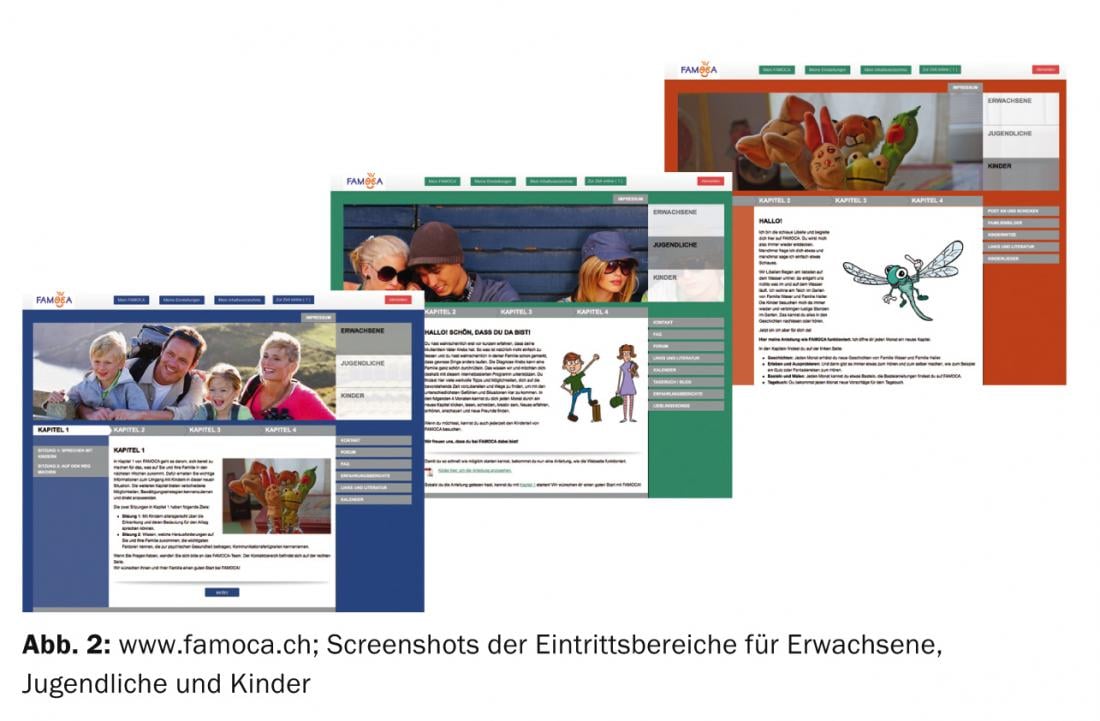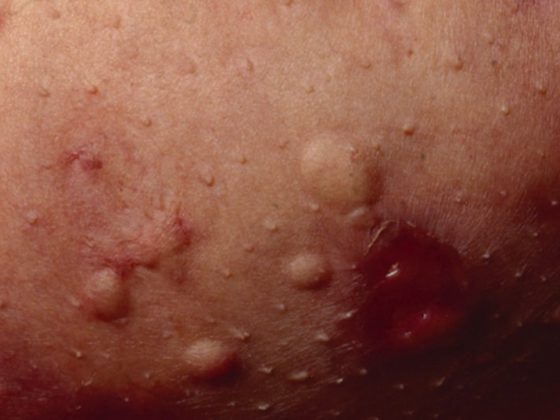Internet-based interventions can help patients with certain diseases. The advantages of online interventions are their low-threshold nature, independence of time and place, and the absence of waiting times. In Switzerland, two online interventions are currently available for cancer patients: STREAM is a stress management program for patients with newly diagnosed cancer, and FAMOCA is aimed at families in which one parent has cancer.
The history of the Internet is barely 20 years young – and yet the World Wide Web has found its way into practically all areas of life. Today, there is still a strong age-related disparity in the population with regard to the duration and type of Internet use. But in a very short time, the group of people over 60, to which the vast majority of cancer patients belong, will also use the Internet even more. Time, then, to explore whether and how Internet-based interventions can help cancer patients.
Internet-based psychotherapies for non-oncology indications.
Based on intensive research, especially in Scandinavia, we now know that Internet-based psychological interventions are effective for certain mental disorders. The greatest experience comes from the treatment of anxiety disorders, post-traumatic stress disorders, and mild to moderate depression. The psychotherapeutic approach most commonly used in online settings is that of cognitive behavioral therapy (CBT). Due to the structured, solution-oriented approach, the CBT is particularly suitable for online implementation. Also essential in terms of effectiveness and to avoid drop-outs seems to be regular written contact (e-mail) with the psychologist.
Under these conditions, Internet interventions achieve comparable efficacy to conventional “face-to-face” therapy in an inter-study comparison [1]. It is thus becoming apparent that Internet intervention with regular contact with the treating psychologist is a valuable addition in the treatment of selected mental illnesses – especially since Internet intervention can also reach patients who resist conventional therapy. Accordingly, Internet therapy is already subject to mandatory health insurance coverage in some countries for defined indications.
Different forms of Internet intervention
The possibilities and offers on the Internet for patients are almost unlimited. Roughly, the following categories can be distinguished:
- Structured online intervention with regular contact with the psychologist
- Internet program for self-help, without contact offer
- Internet portals for exchange with other affected persons (forums, blogs)
- Pure information platforms with addresses, brochures, etc.
Advantages of Internet Therapy
The greatest advantages of using Internet-based support services include their low-threshold nature and increased anonymity. This is particularly beneficial for men, who generally have a higher inhibition threshold than women when it comes to dealing with mental stress or stress-related issues. actively address illnesses and accept offers of support. This shows that Internet interventions do not displace conventional, established therapies, but complement them. Independence of time and place and the absence of waiting for a therapy place are also great advantages of Internet therapy. Accordingly, patients are very interested in participating in Internet interventions.
Limitations of Internet Therapy
Internet intervention is not suitable for acute crisis situations. Therefore, before starting a psychological Internet intervention, it must be ensured that the patient has a local therapeutic contact person.
Online interventions for cancer patients are still in their infancy. Feasibility, indications and effectiveness of such interventions are currently being investigated in the form of studies. Established psychological interventions in cancer patients cannot and should not be replaced by online interventions according to current data [2].
Quality features
Precisely because there are so many options on the Internet, it is important to pay attention to quality when selecting offers. In principle, it must always be clearly evident who is behind a website. Since Internet interventions for cancer patients have not yet been established in the German-speaking world, they take place in the context of studies, so that each participant receives patient information, signs a consent form, an ethics committee has approved the study, and usually there should be no costs associated with participation. It is also important that it is clearly declared how data protection and confidentiality are guaranteed.
Cancer patients and the Internet
Research shows that at least 70% of cancer patients search the Internet for information about their disease in the period shortly after diagnosis. So the Internet has immense potential to reach patients seeking support. This is entirely in line with the National Cancer Program 2011-2015 (NKP II) and the National Strategy against Cancer 2014-2017 (NSK) based on it, which aim to better link existing psycho-oncology services with primary oncology care and make treatment services accessible to all. In addition, the services should be low-threshold and time- and cost-efficient.
Swiss online interventions
Two online interventions are presented below, both developed at the University Hospital Basel in collaboration with the University of Bern and supported by Cancer Research Switzerland and the Swiss National Science Foundation:
- STREAM (www.stress-aktiv-mindern.ch) is the first online stress management program for cancer patients with a new diagnosis in the entire German-speaking world.
- FAMOCA (www.famoca.ch) is an online support service for families with children in which one parent has cancer.
For both interventions, there is regular contact with the psychological team, and both are offered as part of clinical trials approved by the Ethics Committee of Northwestern and Central Switzerland (EKNZ). Participation in the studies is voluntary and free of charge.
STREAM – “Stress-actively-reduce.ch”
The diagnosis of cancer and the subsequent treatment are associated with great psychological stress. In addition to psychological symptoms, chronic stress reactions can also lead to physical changes and increased treatment side effects that interfere with treatment success [3]. STREAM was developed by a team of oncologists and psychologists at Basel University Hospital as the first German-language Internet-based stress management program for cancer patients. The goal of the program is to help patients who have cancer for the first time deal with their stresses. The inclusion criteria are shown in Table 1 . Previous studies have shown good efficacy of CBT interventions in reducing stress and improving disease adaptation. Improved disease management was also confirmed in the first English-language web-based stress management program [4].

The STREAM randomized controlled trial will test the feasibility, feasibility, and preliminary efficacy of the intervention. The study examines which groups of people, in terms of age, gender and type of cancer, use this form of psycho-oncological care and how long and to what extent they use it. To test the effectiveness of the program, study participants will be surveyed about their stress levels and quality of life at two time points. Study participants are recruited primarily via the Internet.
Contents and implementation of the STREAM program
STREAM’s online portal is divided into a public area with general information about the stress management program as well as contact and registration options. The password-protected area is only accessible to study participants (Fig. 1) .

The intervention is based on elements of CBT as well as mindfulness and acceptance-oriented practices. The program includes eight chapters on understanding and addressing the effects of stress at the cognitive, emotional, and physical levels. With the help of interactive elements, coping strategies can be learned and practiced, and resources can be mobilized. Each chapter begins with an informational section (e.g., “Stress and Cancer”), followed by a self-observation and exercise section (e.g., make a list: “What situations in everyday life are stressful for me?”, “Where are my resources?”; audio files to download to an mp3 player with relaxation exercises, imagination journeys, etc.). The program contents are worked on independently by the patients in a predefined sequence. Regular contact with the supervising psychologists of the study team takes place weekly in written form. After program completion, participants are free to continue using the content.
More information, flyers and promotional materials about the program and the study are available at www.stress-aktiv-mindern.ch or stream@usb.ch.
FAMOCA: Online support for families
Parents who have cancer are not only concerned about their own health, but also about the well-being of their children in particular. Family stability, relationships, and quality of life can change after a diagnosis. In this process, about 25-30% of patients, partners and children develop clinically relevant psychological symptomatology [5–7]. Risk factors include a lack of open and affective communication in the family, cohesion, attempts to cope, adaptation in everyday family life, increased psychological stress in parents, and partnership problems [8]. Psycho-oncology family counseling is shown to be effective, but studies are incomplete and long-term outcomes are lacking [9]. And although many affected families want support, some families find it difficult to visit an institution together due to time or geographic constraints. There has not yet been an online offering for families.
The online support program FAMOCA (“family online counseling for families with parental cancer”) addresses risk factors by providing age-appropriate information and practicing coping strategies. The website is divided into an adult, youth and children’s section (Fig. 2).

This allows individual processing, but also joint discovery of the following key topics: Intra-family communication and knowledge about cancer, organizing and managing everyday life during cancer therapy, coping with stressful situations and feelings, strengthening resources and making sense of the future.
Contents and implementation of FAMOCA
In the program the family will find, among others, the following offers:
- Relaxation exercises
- Illustrated children’s stories about everyday life with cancer
- Video about cancer and therapies for teenagers
- Diary for kids and blog for teenagers
- Craft instructions
- Testimonials.
Contact with psychooncologists via e-mail and a separate forum for parents and adolescents also provide an opportunity for exchange.
The effectiveness of the program is currently being evaluated in a randomized controlled trial. Inclusion of the family is done by the study team. After signed informed consent, random assignment to group A or B follows. Group A receives a protected login for the FAMOCA internet program, while group B receives an information package consisting of brochures and material on the topic of cancer and family (“care as usual”). Questionnaires are completed at three measurement time points (baseline, 1. and 2nd follow-up).
Further information and flyer/poster order under www.famoca.ch or info@famoca.ch.
Conclusion for practice
- Therapist-assisted online therapies are already established for some mental disorders and are comparably effective to “face-to-face” interventions.
- Online interventions have the advantages of being low-threshold, independent of time and place, and cost-effective.
- Patients with newly diagnosed cancer can participate in the first German-language online stress management program (STREAM) via www.stress-aktiv-mindern.ch.
- Families with children ages 3-18 who have a parent with cancer can find age-appropriate online support at www.famoca.ch.
- Therapist-assisted online interventions for cancer patients are new and are being offered as part of trials.
Literature:
- Wagner B, Maercker A: Psychotherapists Journal 2011; 1: 34-43.
- Faller H, et al: J Clin Oncol 2013; 31(6): 782-793.
- Mitchell A, et al: Lancet Oncol 2011; 12: 160-174.
- Carpenter KM, et al: J Behav Med 2013, Dec 12 (Epub ahead of print).
- Singer S, et al: Ann Oncol 2009; 21(5): 925-930.
- Pitcealthy C, Maguire P: Eur J Cancer 2003; 39(11): 1517-1524.
- Thastum M, et al: Cancer 2009; 115(17): 4030-4039.
- Visser A, et al: Cancer Treat Rev 2004; 30(8): 683-694.
- Niemelä M, et al: Psychooncology 2010; 19(5): 451-461.
InFo ONCOLOGY & HEMATOLOGY 2015; 3(1): 27-30.











